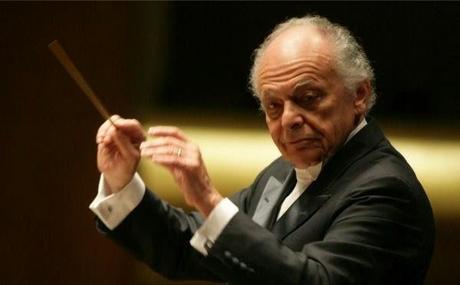by Paul J. Pelkonen

Lorin Maazel conducting the New York Philharmonic.
Photo by Chris Lee © 2013 The New York Philharmonic.
Mr. Maazel's long career started at the age of 9, when he first conducted an orchestra in public. Over eight decades, he became an in-demand international maestro, leading the Munich Philharmonic, the Pittsburgh Symphony Orchestra and the Vienna forces in a path that led from the recording studio to the concert hall podium to the orchestra pit of opera houses around the world.
A cosmopolitan who spoke six languages fluently, Mr. Maazel was born in Paris to an American Jewish family. He played the piano at age 5 and the violin at age 7. He started studying scores at the age of 8 and attended Interlochen, a summer camp for young musicians. After an extensive early music education, he led the New York Philharmonic for the first time at the age of 12.
As an adult, he became known for an idiosyncratic, intellectual style that could veer from fiery energy to cool, analytical washes of sound. A phenomenal musical memory and a lifetime of experience led him to often conduct without the benefit of a score, which could add to the excitement and occasional unpredictability of his performances. Off the podium, his primary instrument was the violin. He was also an impresario, operating a summer music festival from his home in Castleton, Virginia.
In 2001, Mr. Maazel became firmly entrenched in the musical life of New Yorkers when he succeeded Kurt Masur as music director of the New York Philharmonic. He was beloved by the orchestral players, but seen by many writers (including this one) as a stopgap, a conservative successor to Mr. Masur.
His tenure saw an expansion of the Philharmonic repertory into operas in concert, and its highlights included a superb Elektra at Avery Fisher Hall. The most memorable and controversial episode of his tenure was a tour that took the orchestra to Pyongyang, North Korea as musical ambassadors. More importantly, his leadership left the Philharmonic in superb musical condition, anticipating the arrival of current music director Alan Gilbert.
In 2005, Mr. Maazel conducted the London premiere of his first and only opera, a setting of George Orwell's novel 1984 at Covent Garden. Working for the International Herald Tribune at the time, I was able to interview him by telephone from the opera house. I was struck by his intellect and deep musical knowledge. The most memorable moment of the interview was when I asked him how, as a conductor, he was able to separate himself from the music that he had written. He paused, complemented me on the insight of the question, and then acknowledged that it was a challenge and that ultimately he was able to achieve that separation and interpret the written notes as they flowed.
However, his intellectual approach could occasionally frustrate this reviewer, as with his last Metropolitan Opera performances of Don Carlo that opted for beauty over power in Verdi's drama of Spanish politics. More recently, he curtailed his New York activities, missing two concerts with the Munich Philharmonic and forcing Carnegie Hall to hire last minute replacements. His last concert with the New York Philharmonic was in the winter of 2013, and was a reminder of his long rapport with the musicians of that orchestra.

